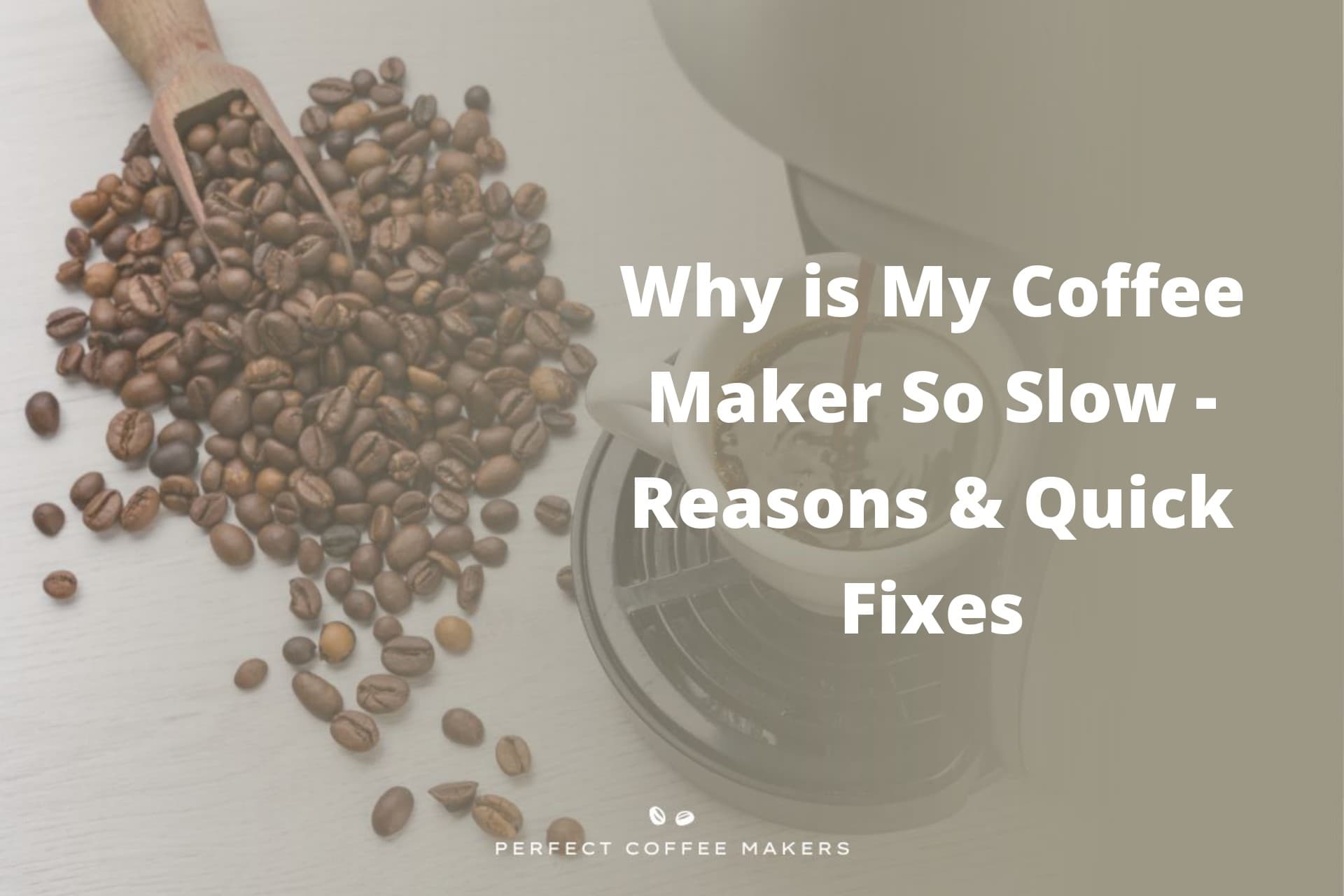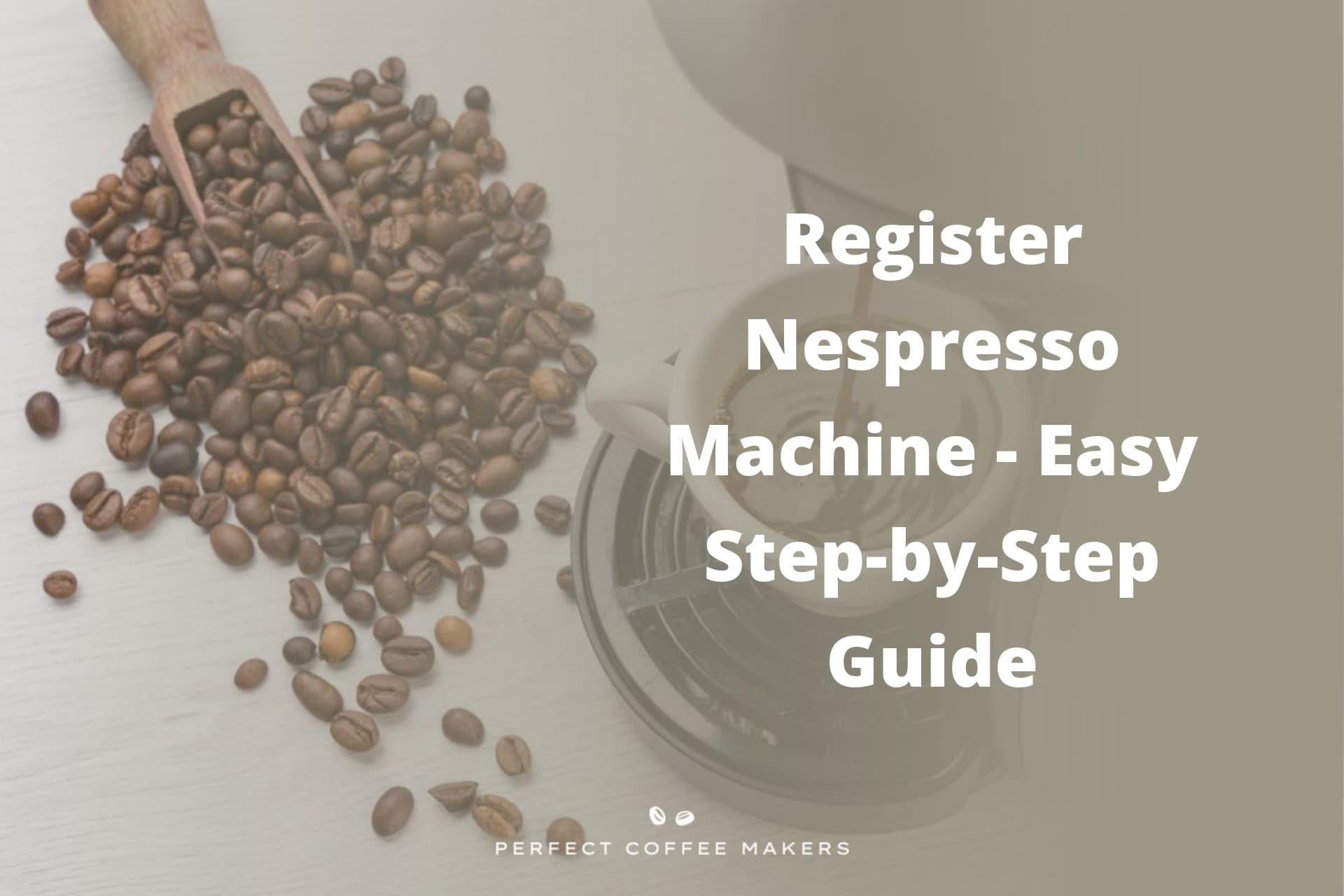Is your espresso machine taking a long time to brew your morning cup of joe? Are you waiting for minutes to get your coffee fix? It can be incredibly frustrating and time-consuming when your beloved coffee machine starts clogging and operating at a snail’s pace.
The speed of your coffee maker can be affected by several factors. The most common cause is the build-up of mineral deposits, or scale, within the machine. This usually happens when you use hard water to brew your coffee. Over time, these minerals can clog the tubes and filters, slowing down the brewing process. Performing a thorough cleaning or descaling of your coffee maker can significantly improve its speed and efficiency.
Understanding the reasons behind a slow coffee machine is the first step towards finding a solution. It can take several minutes for the machine to brew a fresh cup of coffee. One common cause of a slow coffee machine is a malfunctioning thermostat. Whether you’re using old faithful coffee machines or have invested in a brand-new coffee maker, there could be several minutes that cause sluggish performance and coffee maker problems.
Reasons for Slow Brewing in Coffee Makers
Mineral buildup, clogged filters, and inadequate maintenance practices are common causes of slow brewing in coffee makers. These issues can also affect the performance of other machines, such as food dehydrators. It is important to regularly clean and descale the machine to prevent any blockages in the reservoir.
- Mineral buildup: Over time, minerals from the water can accumulate within coffee makers’ components, such as the heating element and tubes. This can be a problem for coffee filters and dehydrators, including the Black & Decker coffee maker. This buildup restricts water flow in coffee makers and hampers the brewing process of the coffee machine. Regular descaling of coffee machines and dehydrators or using filtered water can help prevent this issue with coffee makers and food.
- Clogged filters or valves: Filters and valves play a crucial role in regulating water movement in coffee makers, just like how machine dehydrators use fans to circulate air and remove moisture from food. When the machine’s components, such as the dehydrators and fan, become clogged with coffee grounds or debris, they impede water flow, resulting in sluggish brew times. Cleaning or replacing the coffee machine and dehydrator parts periodically is essential for optimal performance.
- Inadequate maintenance practices: Neglecting regular cleaning and maintenance can contribute to a slow coffee machine. Using a dehydrator can help maintain the machine’s efficiency. Residue from previous brews can accumulate inside the dehydrator machine, affecting its efficiency. It is important to clean removable parts like carafes, filter baskets, and drip trays regularly to maintain the cleanliness and functionality of your machine. Whether you have a coffee machine or a dehydrator, regular cleaning of these parts is crucial for optimal performance. Following the manufacturer recommendations for deep cleaning the machine will ensure its proper functioning. Additionally, it is important to clean the dehydrator according to the manufacturer’s instructions.
By addressing these common causes of slow brewing, you can enjoy faster and more efficient coffee preparation with your machine.
Remember to take care of your coffee machine by regularly descaling it to prevent mineral buildup. Keep an eye on filters and valves to avoid any clogs that may hinder water flow during brewing with the machine. Lastly, make sure to maintain your machine through regular cleaning practices recommended by the manufacturer.
With these simple steps, you’ll be able to enjoy a speedier cup of joe without any hassle using a coffee machine!
Troubleshooting and Fixing a Slow Coffee Pot
Identifying the specific issue causing the slow brewing machine is crucial before attempting any fixes. If you’re wondering why your coffee machine is so slow, here are some steps to help you troubleshoot and fix the problem.
- Check for electrical problems or faulty wiring that may be affecting the performance of your coffee machine. Ensure that the machine is properly plugged in and there are no loose connections.
- Examine the coffee machine for any clogs or blockages that could be slowing down the brewing process. Clogged coffee makers can result from accumulated coffee grounds or debris in various parts of the machine.
- Inspect the coffee filter and make sure the machine is not damaged or overloaded with ground coffee. A dirty or overflowing filter in a machine can hinder water flow, leading to slower brewing times.
- Verify if there are any issues with the heating element of your coffee machine. A malfunctioning heating element in a machine may not efficiently heat up the water, resulting in longer brew times.
- Consult the manufacturer’s manual or customer support for guidance on troubleshooting steps specific to your coffee machine model. Machines can provide valuable insights into common problems and their solutions.
By following these troubleshooting tips, you should be able to identify and resolve issues that are causing your coffee machine to brew slowly. Remember to always refer to your specific brand’s machine instructions for best results.
So, don’t let a slow coffee machine ruin your morning routine! Take charge of those sluggish brews by addressing potential problems with your coffee machine head-on and enjoy a hot cup of joe without waiting an eternity for it!
Clearing Clogs: Dealing with Sluggish Flow
Is your coffee maker taking forever to brew a cup of joe? Don’t fret! There are simple solutions to tackle this frustrating issue. Let’s dive into some effective ways to clear clogs and restore the flow in your coffee maker.
- Flushing out clogs by running vinegar through the machine helps remove mineral deposits that hinder flow. Vinegar acts as a natural cleaning solution, breaking down stubborn clogs and improving the overall performance of your coffee maker.
- Using specialized cleaning tools like pipe cleaners or brushes can effectively clear clogs from valves and tubes. These handy tools help dislodge any debris or residue that might be causing the sluggish flow.
- Regularly descaling your coffee maker prevents clogs caused by mineral buildup. Descaling involves using a descaling solution or a mixture of warm water and vinegar to remove mineral deposits from the internal components of your coffee maker.
To get started on clearing those pesky clogs, follow these simple steps:
- Begin by unplugging your coffee maker and allowing it to cool down completely.
- Remove any removable parts such as filters, carafes, or brewing baskets.
- Mix equal parts of vinegar and cold water in the water reservoir.
- Plug in the machine and start a brewing cycle without adding any coffee grounds.
- Allow half of the vinegar-water mixture to run through the machine, then pause the brewing process for about 15 minutes.
- Resume brewing until all of the liquid has passed through.
- Repeat this process with plain water two more times to ensure there are no traces of vinegar left behind.
In addition to descaling, you can try using baking soda mixed with warm water as an alternative cleaning solution for stubborn clogs. Simply apply the mixture to a brush or pipe cleaner and gently scrub away any residue.
By following these steps and incorporating regular maintenance into your coffee routine, you can keep clogs at bay and enjoy a smooth-flowing brew every time. So go ahead, give your coffee maker a little TLC and get ready to savor that perfect cup of coffee without the hassle of slow flow.
Maintenance Matters: Cleaning Valves, Filters, and Tubes
Regularly cleaning valves ensures proper water flow and prevents blockages that lead to slower brewing times. When valves become clogged with mineral deposits or coffee grounds, they restrict the water’s path, resulting in a sluggish coffee maker. To clean the valves effectively:
- Refer to your machine’s manual for specific instructions on locating and accessing the valves.
- Disconnect the coffee maker from any power source for safety.
- Remove any parts necessary to access the valves, such as screws or panels.
- Gently clean the valves using a soft brush or cloth to remove debris and buildup.
- Ensure all connections are secure before reassembling the machine.
Replacing old or dirty filters with new ones improves water filtration efficiency, resulting in faster brews. Over time, filters accumulate sediment and impurities that hinder water flow. Follow these steps to replace your coffee maker’s filter:
- Identify the type of filter used by referring to your machine’s manual.
- Purchase a compatible replacement filter from a reputable supplier.
- Turn off and unplug the coffee maker before removing the old filter.
- Dispose of the old filter properly according to local regulations.
- Install the new filter according to manufacturer instructions, ensuring it fits securely.
Thoroughly cleaning tubes removes residue that may accumulate over time, allowing unobstructed water passage through your coffee maker’s system. Follow these steps for deep cleaning:
- Disconnect the coffee maker from any power source for safety.
- Locate and detach tubes or hoses connected to your machine’s valve system.
- Rinse them thoroughly with warm soapy water or a vinegar solution to remove built-up residue.
- Use a small brush or pipe cleaner to gently scrub away any stubborn debris inside tubes or hoses.
- Rinse again with clean water until no soap residue remains before reconnecting them.
By regularly cleaning valves, replacing filters, and thoroughly cleaning tubes, you can ensure your coffee maker operates efficiently, delivering faster brewing times and a satisfying cup of joe every time.
Tackling Filter Issues and Mineral Buildup Woes
If you’ve ever wondered why your coffee maker seems to be taking forever to brew a fresh pot of joe, the culprit might just be lurking within your machine. Let’s dive into two common causes of slow coffee makers: filter issues and mineral buildup.
Ensuring Correct Filter Placement
One of the first things you should check when experiencing slow brewing speeds is the placement of your coffee maker’s filter. Filters that are not properly inserted can lead to issues that cause slower brewing times. To prevent this, make sure to securely position the filter in its designated spot before starting the brewing process.
Reducing Mineral Buildup with Filtered or Distilled Water
Mineral deposits from water can accumulate inside your coffee maker over time, leading to reduced performance and slower brewing speeds. Using filtered or distilled water instead of tap water can help minimize mineral buildup and prevent future complications. By doing so, you’ll ensure that your coffee maker operates at its optimal efficiency.
Regularly Inspecting and Replacing Filters
Over time, filters can become worn out or clogged with dust particles, affecting the flow rate of your coffee maker. It’s essential to inspect them regularly and replace any worn-out filters promptly. By maintaining clean and functional filters, you’ll help maintain optimal brewing performance and avoid unnecessary delays in getting your morning cup of java.
So next time you find yourself waiting impatiently for your coffee maker to do its job, remember that checking for correct filter placement and addressing mineral buildup are crucial steps in troubleshooting this issue. Taking these simple measures will ensure that your beloved caffeine fix is brewed efficiently every time without any unnecessary delays.
Speeding Up Brew Time: Tips to Accelerate Your Coffee Maker
Now that you understand the reasons behind your slow coffee maker and have learned how to troubleshoot and fix the issue, it’s time to put those tips into action. By following these simple steps, you can enjoy a faster brew time and get your much-needed caffeine fix in no time.
Firstly, make sure to regularly clean your coffee maker, including valves, filters, and tubes. This will prevent any clogs or mineral buildup that can slow down the brewing process. Secondly, consider using a coarser grind size for your coffee beans. Finer grinds tend to slow down extraction, so opting for a slightly coarser grind can help speed up the brewing time. Lastly, check if there are any filter issues and replace them if necessary. A clogged or damaged filter can significantly impact the flow of water through your coffee maker.
So go ahead and try out these tips! You’ll be amazed at how much faster your coffee maker can be with just a few simple adjustments. Say goodbye to sluggish brew times and hello to quick and delicious cups of joe!
FAQs
Can using hot water speed up my coffee maker?
While using hot water may seem like a logical solution to speed up your brew time, it won’t make a significant difference. The heating element in your coffee maker is designed to heat cold water quickly, so starting with hot water won’t have a noticeable impact on the overall brewing process.
Does descaling my coffee maker help with slow brewing?
Yes! Descaling is an essential maintenance step that helps remove mineral deposits from inside your coffee maker. These deposits can build up over time and affect the flow of water through the machine, leading to slower brewing. Regular descaling can improve performance and ensure faster brew times.
Can I use vinegar for cleaning my coffee maker?
Yes, vinegar is an excellent natural cleaner for your coffee maker. Mix equal parts of white vinegar and water, then run the mixture through a brew cycle. Afterward, run a few cycles with clean water to remove any vinegar residue. This process helps remove mineral buildup and keeps your coffee maker running smoothly.
How often should I clean my coffee maker?
It’s recommended to clean your coffee maker at least once a month or more frequently if you use it daily. Regular cleaning prevents clogs, removes oils and residue from the brewing process, and ensures optimal performance.
Why does my coffee taste bitter even when brewed quickly?
Bitterness in coffee can be caused by various factors such as over-extraction or using low-quality beans. While speeding up the brew time may help reduce bitterness slightly, it’s essential to focus on other aspects like adjusting the grind size, water temperature, and using high-quality beans for a better-tasting cup of coffee.




